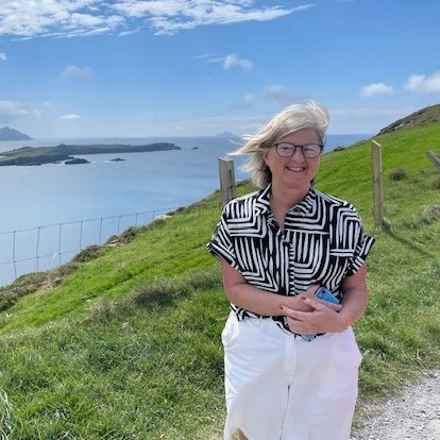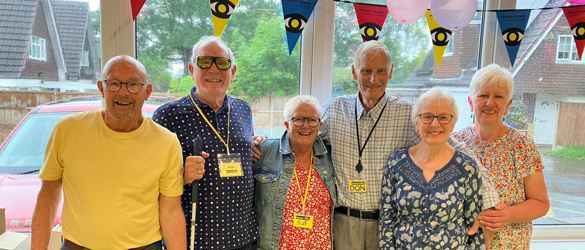“Without counselling, I would have been left in the doldrums - I wasn't me anymore”
Posted: Thursday 28 November 2024
From nursery teaching to supporting people with dementia, Caroline had always associated herself as an outgoing and extraverted person - until her sight began to deteriorate.
Nine years ago, she suffered a bleed in the back of her eyes, a suspected complication of her diabetes.
Although she has still not received a formal diagnosis for her sight loss, Caroline’s deteriorating vision has had a profound impact on her life.
“I wasn't me anymore,” she said. “There was a lot of sadness. My life had changed, and I had lost independence.”
A change in sight
It was while running a music workshop for people with dementia, a role she took on during her retirement, that Caroline first noticed changes to her vision. She realised she couldn’t carry on.
“I would go round to the nursing homes and entertain them but my eyes were becoming affected, and I couldn’t see people’s faces in detail, which is important because I needed to know how they were reacting to the music,” she said. “It’s amazing what music can bring out of you but I had to stop that, and it was all pointing to one direction then.”
Caroline, who also attends the monthly Neath Macular Support Group, referred herself for counselling in 2020 after she had been told about the Macular Society through her local hospital.
She said: “There was a period of two years where I was stuck at home and even though I have a busy family, I was feeling very, very lonely with this. It was still quite early on but I rang the Macular Society because I had read about the support it offered and I was interested in the telephone counselling.”
Support through counselling
Caroline said it was an emotional six-weeks’ worth of sessions, but that the counselling allowed her the opportunity to speak to someone who understood how sight loss was affecting her.
Caroline said: “I cried a bit, I would take myself to the bedroom and sit in there and talk to the counsellor. I went into it with this feeling of being lost, I didn’t even know how to explain it all to my husband. It was better to talk to somebody who was one step removed from me, but who cared and had an idea of what this was like for me. That brought a sense of relief. I could finally tell somebody how difficult things were. I can recall feeling locked in my house and how uncomfortable I was with all this.
“Without the counselling, I think I would have been left in the doldrums and I wasn't me anymore. I had become introverted and before this I was a nursery teacher, working in therapy and a playgroup so I had a personality, which I didn’t have anymore.
She added: “That support was like a friendship, someone who understood me on a personal level, the changes I was going through and there was a lot of kindness and understanding shown to me.”
Shared experience
An extension of that support has come from the local support group in South Wales, where Caroline has met other people with macular conditions.
She said: “We enjoy the get-together, grabbing a coffee and the information, or talks and people coming along and showing us various interesting things.
“It’s a place to make friends with people who are exactly the same as you, maybe struggling with life, struggling with everyday things. All of us together are like-minded people. We’ve had the RNIB in to talk through gadgets, and people will say ‘I’ve tried this or that’. There’s just a lot of support for another.”
Donations made in memory of loved ones fund Macular Society services such as our Counselling service, which is a free, UK telephone service for people like Caroline, who have been diagnosed with macular disease or their family members.
Do you need support?
To find out more about the Macular Society Counselling service, call our helpline.
Macular Society Counselling service
Are you dealing with the emotional challenges of macular disease? It can help to speak to a professional counsellor, who is trained to listen and to talk through your feelings and help you find ways of dealing with them. Use our free service today.
Local support groups
Our support groups are for people of working age and older, and provide information, support and friendship to people with macular disease and sight loss. Find your local support group today.




